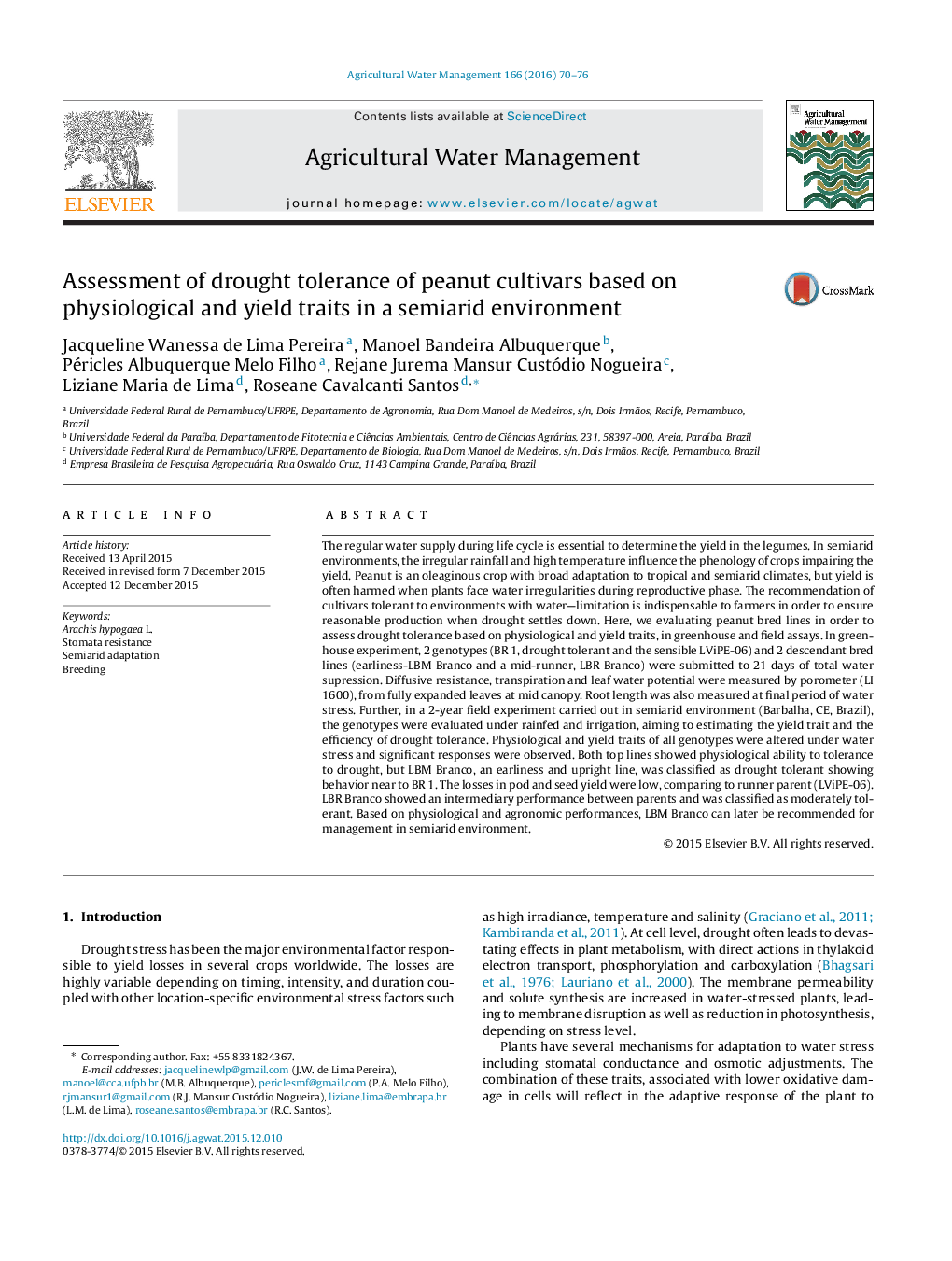| کد مقاله | کد نشریه | سال انتشار | مقاله انگلیسی | نسخه تمام متن |
|---|---|---|---|---|
| 6363581 | 1622914 | 2016 | 7 صفحه PDF | دانلود رایگان |
عنوان انگلیسی مقاله ISI
Assessment of drought tolerance of peanut cultivars based on physiological and yield traits in a semiarid environment
ترجمه فارسی عنوان
ارزیابی تحمل به خشکی ارقام بادام زمینی بر اساس صفات فیزیولوژیکی و عملکردی در یک محیط نیمه خشک
دانلود مقاله + سفارش ترجمه
دانلود مقاله ISI انگلیسی
رایگان برای ایرانیان
کلمات کلیدی
موضوعات مرتبط
علوم زیستی و بیوفناوری
علوم کشاورزی و بیولوژیک
علوم زراعت و اصلاح نباتات
چکیده انگلیسی
The regular water supply during life cycle is essential to determine the yield in the legumes. In semiarid environments, the irregular rainfall and high temperature influence the phenology of crops impairing the yield. Peanut is an oleaginous crop with broad adaptation to tropical and semiarid climates, but yield is often harmed when plants face water irregularities during reproductive phase. The recommendation of cultivars tolerant to environments with water-limitation is indispensable to farmers in order to ensure reasonable production when drought settles down. Here, we evaluating peanut bred lines in order to assess drought tolerance based on physiological and yield traits, in greenhouse and field assays. In greenhouse experiment, 2 genotypes (BR 1, drought tolerant and the sensible LViPE-06) and 2 descendant bred lines (earliness-LBM Branco and a mid-runner, LBR Branco) were submitted to 21 days of total water supression. Diffusive resistance, transpiration and leaf water potential were measured by porometer (LI 1600), from fully expanded leaves at mid canopy. Root length was also measured at final period of water stress. Further, in a 2-year field experiment carried out in semiarid environment (Barbalha, CE, Brazil), the genotypes were evaluated under rainfed and irrigation, aiming to estimating the yield trait and the efficiency of drought tolerance. Physiological and yield traits of all genotypes were altered under water stress and significant responses were observed. Both top lines showed physiological ability to tolerance to drought, but LBM Branco, an earliness and upright line, was classified as drought tolerant showing behavior near to BR 1. The losses in pod and seed yield were low, comparing to runner parent (LViPE-06). LBR Branco showed an intermediary performance between parents and was classified as moderately tolerant. Based on physiological and agronomic performances, LBM Branco can later be recommended for management in semiarid environment.
ناشر
Database: Elsevier - ScienceDirect (ساینس دایرکت)
Journal: Agricultural Water Management - Volume 166, 1 March 2016, Pages 70-76
Journal: Agricultural Water Management - Volume 166, 1 March 2016, Pages 70-76
نویسندگان
Jacqueline Wanessa de Lima Pereira, Manoel Bandeira Albuquerque, Péricles Albuquerque Melo Filho, Rejane Jurema Mansur Custódio Nogueira, Liziane Maria de Lima, Roseane Cavalcanti Santos,
